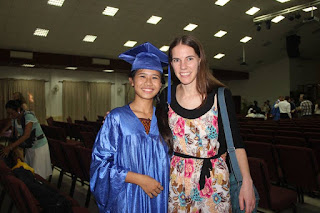When I mentioned to my internship coordinator this spring that
I dream of training Cambodian teachers someday, her eyes lit up. “Maybe we
could get you doing some of that this summer!” She consulted with someone on
the ground here, and they decided I’d work with four English teachers (all
native Cambodians) in a middle school and a high school within Caring for Cambodia.
I was really grateful and excited. What a perfect
opportunity to get my feet wet and learn more about Cambodian teachers and
schools. And surely my six years at Logos had to be an asset, given all I learned
there about teaching foreign languages, low-tech lessons, communicating with Cambodians,
etc. But I was also a little apprehensive. Eight weeks in Siem Reap. How much
could I do in eight weeks?
As much as possible, I concluded. So I jumped into observing
them, teaching alongside them, chatting with them, and assembling handouts and
presentations for them. I tried to balance proactivity and flexibility, and hoped for the best.
I’ve had exhilarating moments of success reminding me why I
love being in the classroom. I’m a
natural! I’ve got this down! This is what I was made to do! I’m totally going
into this after I graduate! A flash of intuition pans out. Students are
angelic. The lesson clicks with everyone. A teacher says, “Wow, can you tell me more about that?” I’ve thrived on chances to replace an irrelevant, teacher-centered
lesson from the textbook with something more engaging and student-centered.
And I’ve had moments that brought my ego crashing down. The
couple times I’ve been observed, I couldn’t believe how nervous I felt. The handout
I’d worked so hard on suddenly seemed impossibly complicated for my audience, a
waste of their time. The rapport I was starting to achieve with teachers seemed
to vanish, replaced by miscommunications and hemming and hawing. Other times, I
haven’t needed an outsider observing me. All it’s taken is a group of students
who pay no heed to my attempts to quiet them, or a teacher who greets my sample
lesson with apathy and criticism, or my own reflections on a meeting, for me to
feel about as competent as your average 4-year-old, and as culturally sensitive as the White Savior Barbie.
I’m realizing that the latter moments, while uncomfortable,
have been far more necessary for me than the former. First of all, they’re a
good reality check. Being a new teacher was hard and my lessons often tanked.
Why would I expect anything different from mentoring teachers? Secondly, my self-consciousness
is a good reminder of what I’m putting teachers through as I observe and mentor them. (Even
more so as they try to teach a foreign language in front of a native speaker!)
Finally, they remind me of what I learned all year in grad
school: Contextualization is vital. I
don’t like it when the teachers sometimes blame students for not grasping English
lessons that don’t address their needs and interests. But I’ve made the same
error (actually worse) when I’ve made minimal tweaks to US-based teaching tips that
are a poor fit for these teachers, and then inwardly faulted them for not
recognizing the superiority of American education to their methods. That’s not
showing them a better alternative to shaming; that’s just shifting the blame up
a level. There’s a huge gulf between their educational experiences and mine, and
it’s not fair of me to ask them to do the work to bridge it. If I want to partner
with them, I need to wrangle with the question of how they can teach well in their context.
A few weeks ago, I saw a great article entitled, “Upward or
downward first?” It has two lists: the results of pursuing fruit versus pursuing roots.
One list reads….
 |
| A tree growing out of Ta Prohm temple |
One list reads….
When our greatest desire is to grow upward:
We think a lot about our
reputation, so often swing between pride and insecurity.
We’re likely known for talking a
lot.
We’re elated when we’re praised
and frustrated when ignored.
We often say, "I need to do more faster."
We often say, "I need to do more faster."
And so the list continues. Honestly, a lot of it has described me this summer more often than I'd like to admit.
The parallel and inverse list describes when we long to grow
downward:
We may track outcomes, but we
define success most of all by the quality of things that are hard to see at first: hearts, faith,
well-being, character.
We feel the light yoke of
self-forgetfulness.
We’re known especially for
listening well.
We’re grateful when praised and
content when ignored.
I want the second list to define me. And not just so I’ll
eventually become the most awesome teacher trainer ever, though that motivation
has occurred to me a few times. (Argh, pride is so sneaky!) I feel like Eustace when he becomes a dragon in C.S. Lewis' Voyage of the Dawn Treader, feeling self-satisfied because I’ve
scratched off my dragon skin, only to realize what I discarded was a paper-thin
shell, and the human is stuck hopelessly deep
inside all the dragony self that remains.
But Eustace finally meets Aslan. “You will have to let me
undress you,” Aslan tells Eustace, and Eustace decides his desperation to
become human again outweighs his fear of Aslan’s claws.
"'The very first tear he made
was so deep that I thought it had gone right into my heart. And when he began pulling the skin off, it
hurt worse than anything I've ever felt. The only thing that made me able to bear it was just the pleasure of feeling the
stuff peel off. You know - if you've
ever picked the scab off a sore place. It hurts like billy-oh but it is such
fun to see it coming away.’"
I’m near the end of my summer in Cambodia, and little wiser than before
about how to partner well with teachers here. But maybe that’s OK. While I’d love to see some
upward growth – some teachers applying what I’ve taught, some students getting more out of English class, some materials being put to use – that’s no longer my
top priority. This girl needs to grow downward into self-forgetfulness, and sometimes that means holding still long enough for God to strip off layers of pride. If nobody
else learns a thing from my teacher training endeavors this summer, that lesson will already be well worth it.













































